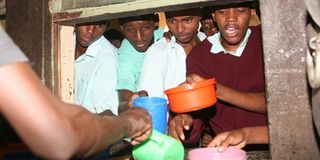Garba-Tulla thirsts for its past glory

Students of Garba Tulla High School being served tea. PHOTO | FILE
What you need to know:
- The school has produced top personalities but is a pale shadow of its former self
- Clashes between local people led to poor KCSE performance and closure in 2000
Garba-Tulla High School was once a military base for forces fighting bandits in the 60s and 70s. When the guns fell silent, it was converted to a national school.
But at the turn of the century, anarchy returned. And the once iconic institution disappeared with regard to national exams.
In the Borana language, the school’s name loosely translates to "a place of inexhaustible waters." Now Garba-Tulla thirsts and hungers for its past glory.
A former Board of Governors chairman, Mr Morku Haleke, says Garba-Tulla’s woes began in the late 1990s with renewed banditry and tribal clashes in the area.
“There were constant conflicts between Somalis and Boranas. That instilled fear in many and meant we could no longer attract the best,” says the former student who also served as a teacher.
In the late 2000, the granary that had produced great minds closed its doors. It was, however, reopened in 2002 by admitting form one students.
A former Garba-Tulla teacher, Ms Grace Wanjiru, has fond memories.
“My experiences there gave me a different perspective of life. I learnt to appreciate people from diverse cultures,” she says.
SAME RITUAL
“We would board a bus and pay Sh60 for the five-hour journey to Isiolo. We then took a short break and then get into a lorry for Garba-Tulla at Sh40. The truck would also be packed with goats and sheep,” she adds.
She says that arriving at the school dusty and exhausted was part of the excitement. The current crop of students go through the same ritual.
At the reception, a typist bangs away on a rickety typewriter.
Isiolo Deputy Governor who is also an old boy, Dr Mohamed Gulleid, says it is painful to see the depths the school had sunk.
“More than anything else, Garba-Tulla needs to regain its status. The alumni in collaboration with the county government have started to refurbish the lab and library” said Dr Gulleid.
Some prominent personalities who learned at Garba-Tulla include Marsabit Governor Mr Ukur Yattani, Isiolo Women Rep, Mrs Tia Galgalo, MPs Adan Keynan and Shaban Ali and nominated Senator Ms Fatma Dulu.
These former students hang their heads in shame in the face of the school’s dwindling academic performance, falling enrolment, dilapidated infrastructure and student indiscipline
KRAAL WITH GOATS
The dining hall looks like a kraal with goats from a local village scrambling for food remains.
“If you don’t get the best students from primary school, the end product will not be good,” says Mr Haleke.
And he has no kind words for the local peoples.
“When Garba-Tulla was a national school, a politician petitioned President Moi to make the school open a special stream for local students. That hurt quality,” he says.
In 2009, the school had a mean score of 4.29 (D+), 3.94 (D+) the following year and in 2011, it had 3.46 (D). It continued with the downward spiral with a score of 3.26 (D) while the 2013 score was 2.84 (D).
Principal Charles Kamau says bad performance was largely due to poor teaching staff.
IMPROVING PERFORMANCE
“Take English, for example. Students used to sit for only one paper. They were not exposed to literature and composition,” he says.
Mr Kamau’s administration is determined to improve performance and is now administering tests consistently.
There is also close supervision of students and teachers.
Out of 12 classes, only four are being used.
The problem Garba-Tulla faces is what other schools countrywide would like to experience.
“I can’t say the school has a shortage of teachers but a shortage of students,” says the principal.
From next year, Garba-Tulla will get back its national status.
Mr Kamau also says that from the outset, there was no deliberate effort to integrate the institution to the local people.
“The school was started by Christian missionaries in a Muslim dominated community. Only a handful of the students from the district got enough marks to be admitted here” he said.





